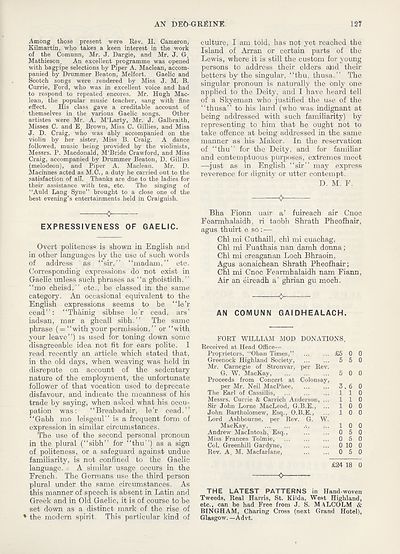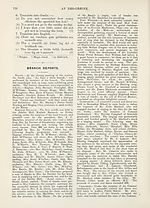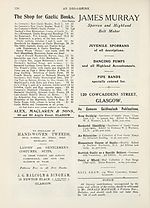An Comunn Gàidhealach Publications > Deo-gréine > Volume 17, October 1921 to September 1922
(135) Page 127
Download files
Complete book:
Individual page:
Thumbnail gallery: Grid view | List view

AN DEO-GREINE
127
Among those present were Rev. H. Cameron,
Kilmartin, who takes a keen interest in the work
of the Comunn, Mr. J. Dargie, and Mr. J. G.
Mathieson. An excellent programme was opened
with bagpipe selections by Piper A. Maclean, accom¬
panied by Drummer Beaton, Melfort. Gaelic and
Scotch songs were rendered by Miss J. M. B.
Currie, Ford, who was in excellent voice and had
to respond to repeated encores. Mr. Hugh Mac-
lean, the popular music teacher, sang with fine
effect. His class gave a creditable account of
themselves in the various Gaelic songs. Other
artistes were Mr. A. M‘Larty, Mr. J. Galbraith,
Misses C. and E. Brown, Miss C. Gillies, and Miss
J. D. Craig, who was ably accompanied on the
violin by her sister, Miss B. Craig. A dance
followed, music being provided by the violinists,
Messrs. P. Macdonald, M‘Bride Crawford, and Miss
Craig, accompanied by Drummer Beaton, D. Gillies
(melodeon), and Piper A. Maclean. Mr. D.
Macinnes acted as M.C., a duty he carried out to the
satisfaction of all. Thanks are due to the ladies for
their assistance with tea, etc. The singing of
“Auld Lang Syne” brought to a close one of the
best evening’s entertainments held in Craignish.
EXPRESSIVENESS OF GAELIC.
Overt politeness is shown in English and
in other languages by the use of such words
of address as “sir,” “madam,” etc.
Corresponding expressions do not exist in
Gaelic unless such phrases as “a ghoistidh, ”
“mo cheisd,” etc., be classed in the same
category. An occasional equivalent to the
English expressions seems to be “le’r
cead”: “Thainig sibhse le’r cead, ars'
iadsan, mar a gheall sibh.” The same
phrase ( = “with your permission,” or “with
your leave”) is used for toning down some
disagreeable idea not fit for ears polite. I
read recently an article which stated that,
in the old days, when weaving was held in
disrepute on account of the sedentary
nature of the employment, the unfortunate
follower of that vocation used to deprecate
disfavour, and indicate the meanness of his
trade by saying, when ashed what his occu¬
pation was: “Breabadair, le’r cead.”
“Gabh mo leisgeul” is a frequent fonn of
expression in similar circumstances.
The use of the second personal pronoun
in the plural (“sibh” for “thu”) as a sign
of politeness, or a safeguard against undue
familiarity, is not confined to the Gaelic
language. A similar usage occurs in the
French. The Germans use the third person
plural under the same circumstances. As
this manner of speech is absent in Latin and
Greek and in Old Gaelic, it is of course to be
set down as a distinct mark of the rise of
* the modem spirit. This particular kind of
culture, I am told, has not yet reached the
Island of Arran or certain parts of the
Lewis, where it is still the custom for young
persons to address their elders add their
betters by the singular, “thu, thusa. ” The
singular pronoun is naturally the only one
applied to the Deity, and I have heard tell
of a Skyeman who justified the use of the
“thusa” to his laird (who was indignant at
being addressed with such familiarity) by
representing to him that he ought not to
take offence at being addressed in the same
manner as his Maker. In the reservation
of “thu” for the Deity, and for familiar
and contemptuous purposes, extremes meet
—just as in English “sir” may express
reverence for dignity or utter contempt.
D. M. F.
/>
Bha Fionn uair a’ fuireach air Cnoc
Fearmhalaidh, ri taobh Shrath Pheofhair,
agus thuirt e so : —
Chi mi Cuthaill, chi mi cuachag,
Chi mi Fuathais nan damh donna;
Chi mi creaganan Loch Bhraoin,
Agus aonaichean Shrath Pheofhair;
Chi mi Cnoc Fearmhalaidh nam Fiann,
Air an eireadh a' ghrian gu moch.
£
AN COMUNN GAIDHEALACH.
FORT WILLIAM MOD DONATIONS.
Received at Head Office—
Proprietors, “Oban Times,” ... ... £5
Greenock Highland Society, 5
Mr. Carnegie of Stronvar, per Rev.
G. W. MacKay, 5
Proceeds from Concert at Colonsay,
per Mr. Neil MacPhee, 3 .
The Earl of Cassillis, 1
Messrs. Currie & Carrich Anderson, ... 1
Sir John Lome MacLeod, G.B.E., ... 1
John Bartholomew, Esq., O.B.E., ... 1
Lord Ashbourne, per Rev. G. W.
MacKay,
Andrew Macintosh, Esq.,
Miss Frances Tolmie,
Col. Greenhill Gardyne,
Rev. A. M. Macfarlane,
-«>■
THE LATEST PATTERNS in Hand-woven
Tweeds, Real Harris, St. Kiida, West Highland,
etc., can be had Free from J. S. MALCOLM &
BINGHAM, Charing Cross (next Grand Hotel),
Glasgow. —Advt.
127
Among those present were Rev. H. Cameron,
Kilmartin, who takes a keen interest in the work
of the Comunn, Mr. J. Dargie, and Mr. J. G.
Mathieson. An excellent programme was opened
with bagpipe selections by Piper A. Maclean, accom¬
panied by Drummer Beaton, Melfort. Gaelic and
Scotch songs were rendered by Miss J. M. B.
Currie, Ford, who was in excellent voice and had
to respond to repeated encores. Mr. Hugh Mac-
lean, the popular music teacher, sang with fine
effect. His class gave a creditable account of
themselves in the various Gaelic songs. Other
artistes were Mr. A. M‘Larty, Mr. J. Galbraith,
Misses C. and E. Brown, Miss C. Gillies, and Miss
J. D. Craig, who was ably accompanied on the
violin by her sister, Miss B. Craig. A dance
followed, music being provided by the violinists,
Messrs. P. Macdonald, M‘Bride Crawford, and Miss
Craig, accompanied by Drummer Beaton, D. Gillies
(melodeon), and Piper A. Maclean. Mr. D.
Macinnes acted as M.C., a duty he carried out to the
satisfaction of all. Thanks are due to the ladies for
their assistance with tea, etc. The singing of
“Auld Lang Syne” brought to a close one of the
best evening’s entertainments held in Craignish.
EXPRESSIVENESS OF GAELIC.
Overt politeness is shown in English and
in other languages by the use of such words
of address as “sir,” “madam,” etc.
Corresponding expressions do not exist in
Gaelic unless such phrases as “a ghoistidh, ”
“mo cheisd,” etc., be classed in the same
category. An occasional equivalent to the
English expressions seems to be “le’r
cead”: “Thainig sibhse le’r cead, ars'
iadsan, mar a gheall sibh.” The same
phrase ( = “with your permission,” or “with
your leave”) is used for toning down some
disagreeable idea not fit for ears polite. I
read recently an article which stated that,
in the old days, when weaving was held in
disrepute on account of the sedentary
nature of the employment, the unfortunate
follower of that vocation used to deprecate
disfavour, and indicate the meanness of his
trade by saying, when ashed what his occu¬
pation was: “Breabadair, le’r cead.”
“Gabh mo leisgeul” is a frequent fonn of
expression in similar circumstances.
The use of the second personal pronoun
in the plural (“sibh” for “thu”) as a sign
of politeness, or a safeguard against undue
familiarity, is not confined to the Gaelic
language. A similar usage occurs in the
French. The Germans use the third person
plural under the same circumstances. As
this manner of speech is absent in Latin and
Greek and in Old Gaelic, it is of course to be
set down as a distinct mark of the rise of
* the modem spirit. This particular kind of
culture, I am told, has not yet reached the
Island of Arran or certain parts of the
Lewis, where it is still the custom for young
persons to address their elders add their
betters by the singular, “thu, thusa. ” The
singular pronoun is naturally the only one
applied to the Deity, and I have heard tell
of a Skyeman who justified the use of the
“thusa” to his laird (who was indignant at
being addressed with such familiarity) by
representing to him that he ought not to
take offence at being addressed in the same
manner as his Maker. In the reservation
of “thu” for the Deity, and for familiar
and contemptuous purposes, extremes meet
—just as in English “sir” may express
reverence for dignity or utter contempt.
D. M. F.
/>
Bha Fionn uair a’ fuireach air Cnoc
Fearmhalaidh, ri taobh Shrath Pheofhair,
agus thuirt e so : —
Chi mi Cuthaill, chi mi cuachag,
Chi mi Fuathais nan damh donna;
Chi mi creaganan Loch Bhraoin,
Agus aonaichean Shrath Pheofhair;
Chi mi Cnoc Fearmhalaidh nam Fiann,
Air an eireadh a' ghrian gu moch.
£
AN COMUNN GAIDHEALACH.
FORT WILLIAM MOD DONATIONS.
Received at Head Office—
Proprietors, “Oban Times,” ... ... £5
Greenock Highland Society, 5
Mr. Carnegie of Stronvar, per Rev.
G. W. MacKay, 5
Proceeds from Concert at Colonsay,
per Mr. Neil MacPhee, 3 .
The Earl of Cassillis, 1
Messrs. Currie & Carrich Anderson, ... 1
Sir John Lome MacLeod, G.B.E., ... 1
John Bartholomew, Esq., O.B.E., ... 1
Lord Ashbourne, per Rev. G. W.
MacKay,
Andrew Macintosh, Esq.,
Miss Frances Tolmie,
Col. Greenhill Gardyne,
Rev. A. M. Macfarlane,
-«>■
THE LATEST PATTERNS in Hand-woven
Tweeds, Real Harris, St. Kiida, West Highland,
etc., can be had Free from J. S. MALCOLM &
BINGHAM, Charing Cross (next Grand Hotel),
Glasgow. —Advt.
Set display mode to:
![]() Universal Viewer |
Universal Viewer | ![]() Mirador |
Large image | Transcription
Mirador |
Large image | Transcription
| An Comunn Gàidhealach > An Comunn Gàidhealach Publications > Deo-gréine > Volume 17, October 1921 to September 1922 > (135) Page 127 |
|---|
| Permanent URL | https://digital.nls.uk/127171593 |
|---|
| Description | Leabhar 17, Treasamh Mios an Fhoghair 1921 gu Dara Mìos an Fhoghair 1922 |
|---|---|
| Attribution and copyright: |
|
| Description | This contains items published by An Comunn, which are not specifically Mòd-related. It includes journals, annual reports and corporate documents, policy statements, educational resources and published plays and literature. It is arranged alphabetically by title. |
|---|
| Description | A collection of over 400 items published by An Comunn Gàidhealach, the organisation which promotes Gaelic language and culture and organises the Royal National Mòd. Dating from 1891 up to the present day, the collection includes journals and newspapers, annual reports, educational materials, national Mòd programmes, published Mòd literature and music. |
|---|---|
| Additional NLS resources: |
|

